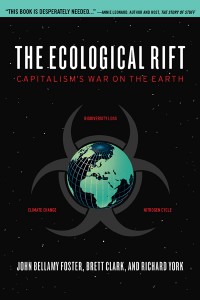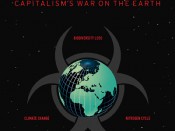The Great Financial Crisis began in the summer of 2007 and three years later, despite a putative “recovery,” it is still having profound effects in the United States, Europe, and in much of the world. Austerity is being forced on working people in many countries. Matters are especially difficult in Greece, a country that is being compelled by the demands of bankers, including the International Monetary Fund, to squeeze its workers in return for loans from abroad to help pay down government debts. Official unemployment in the United States is still around 10 percent, and real unemployment is much higher. An unprecedented 44 percent of the officially unemployed have been without work for over six months. A record number of people are receiving government food assistance as well as meals and groceries from charities. Many U.S. states and cities, facing large shortfalls in their budgets due to falling tax revenues, are cutting jobs and reducing funding for schools and social programs.Much of the attention devoted to determining the cause of the crisis has been directed at the role of “subprime” mortgages in the United States that were sold to low-income people who had little chance of being able to pay the mortgages on their homes. Many of these subprime loans were given out under predatory terms that were especially unfavorable to the unsuspecting borrowers. The bundling of these loans together to be sold to institutions around the world served to spread significant risk far and wide.Yet, despite the instability generated by such loans, and a whole host of exotic financial instruments associated with them, the very severity of the Great Financial Crisis suggests that it was not primarily a product of such speculative practices. Rather, it was the outcome in the main of long-term structural factors, reflected in the secular decline in economic growth rates and the long-run increase of financial fragility and instability.The economic growth rates of the rich countries at the center of the capitalist world system have been shifting into low gear for decades. In the United States, average GDP growth, corrected for inflation, dropped from 4.4 percent in the 1960s, to 3.3 in the 1970s, 3.1 in the 1980s and 1990s, and 1.9 in the 2000s (2000 to 2009). In response to these conditions of deepening economic stagnation within the “real economy,” excess money capital flowed into the financial sector seeking quick returns, leading to the creation of a massive financial superstructure on top of a weakening economic base. This resort to speculative finance as a wealth-generation strategy gave rise to huge artificial profits (and capital gains) seemingly out of thin air—with no real relation to the commodity economy.In this situation, larger and larger infusions of debt—household, corporate, and government—were needed to generate a given level of growth. At the same time, the whole debt balloon, which more and more took on the character of Ponzi finance, required constant infusions of cash merely to stave off the inevitable crash. The result was a literal explosion of debt, which reached an astronomical 350 percent of U.S. GDP by 2007.
Financial bubbles are invariably symptoms of deeper underlying problems. To focus simply on subprime loans, or even the housing bubble itself, as the real cause of the crisis—as most orthodox economic commentators have done—is thus to mistake the symptom for the disease. If it hadn’t been for the housing bubble in the United States, there would have been another bubble that would have likely led to essentially the same results. Since the 1970s, the economy has seen more and more “credit crunches,” with central banks each time rushing in at the first sign of trouble to bail out failing financial institutions. This, however, has contributed to the growing financial fragility, while the underlying problem of stagnation has remained unaddressed.
Three years since the onset of the Great Financial Crisis, matters have become so serious that Paul Krugman, winner of the Bank of Sweden’s Nobel Memorial Prize in the Economic Sciences, has declared that we are now in (or entering) a Third Depression, i.e., a third period of economic stagnation. This Third Depression, he suggests, resembles both the stagnation that began in Europe and the United States in the 1870s, which he labels the Long Depression, and the stagnation of the 1930s, or the Great Depression. As Krugman writes: “We are now, I fear, in the early stages of a third depression. It will probably look more like the Long Depression than the much more severe Great Depression. But the cost—to the world economy, and, above all, to the millions of lives blighted by the absence of jobs—will nonetheless be immense.” Krugman contends that “this third depression will be primarily the result of a failure of policy”—the continuation, even in a severe downturn of the neoliberal policy of austerity aimed at erasing government deficits, as opposed to adopting a strong Keynesian stimulus policy as a way out of the crisis.
It is true that misguided neoliberal deficit-fighting economic policies during a slump will cause further damage to economic prospects. But Keynesian stimulus offers no genuine solution. The real problem, we argue, is not economic policy but capitalist development itself. Our thesis, in the briefest possible terms, is that the advanced capitalist economies are caught in a tendency to stagnation resulting from the dual processes of industrial maturation and monopolistic accumulation. Financialization (the shift in the center of gravity of the capitalist economy from production to finance) is to be regarded as a compensatory mechanism that has helped to lift the economic system under these circumstances, but at the expense of increased fragility. Capitalism is thus caught in what we call a “stagnation-financialization trap.”
All of this is connected to the class structure of monopoly-finance capital, which has produced levels of inequality without precedent in the advanced capitalist world. The so-called “Forbes 400,” the 400 richest Americans, now own about as much wealth as the bottom half of the population, some 150 million people. A number of Citigroup analysts have recently argued that the United States and other rich economies are now so top heavy from the standpoint of wealth and income distribution that they are best described as “plutonomies,” in which small class fractions control increasingly large portions of social wealth.
To be sure, emerging economies, notably China and India, have not yet acquired the diseases of maturity and monopolization in the sense of the advanced capitalist states and thus are relatively free from the chronic illness that has crippled the countries at the center of the system. But emerging countries are far from being immune to the problems generated. Indeed, there is every reason to believe that they too will be impacted in multiple ways in today’s globalized economy as a result of the weakening of the system at its core. It is worth noting that the Long Depression was followed by a great wave of imperialist expansion leading up to the First World War, while the Great Depression led to the inter-imperialist conflict of the Second World War. The current Third Depression is already pointing ominously to heightened imperial conflict, centered especially in the Persian Gulf, which could potentially lead to devastating consequences for humanity as a whole.
If all this were not enough, the world is now facing an even more serious peril: a rapidly accelerating planetary ecological crisis that threatens, if radical changes are not made in the next decade or two, the eventual collapse of most of the world’s ecosystems, together with human civilization itself.
There is only one possible solution to this all-encompassing planetary crisis, and that is the euthanasia of capitalism, replacing it with a new economy geared to sustainable human development, ecological plenitude, and the cultivation of genuine human community. The sooner we begin to construct this qualitatively new system through our mass struggles, the better the long-term prospects for humanity and the earth will be.
Eugene, Oregon
Burlington, Vermont
June 30, 2010
[English language version of preface to the Bangla edition of The Great Financial Crisis. Spanish language translation by Alberto Nadal in El Diario Internacional (December 2010). Italian version published by Attac Italia, January 7, 2011, at HYPERLINK” http://www.italia.attac.org/spip/spip.php?article3525″
http://www.italia.attac.org/spip/spip.php?article3525. French translation printed by Le HYPERLINK “http://translate.googleusercontent.com/translate_c?anno=2&hl=en&rurl=translate.google.com&sl=fr&tl=en&u=http://www.cadtm.org/&usg=ALkJrhhASr3MtAqVLKrb5KmngEWMpdgxrA” Comité pour l’Annulation de la Dette du Tiers Monde, December 29, 2010. Galician translation published by Avantar, December 21, 2010, http://www.galizacig.com/avantar/autor/john-bellamy-foster-e-fred-magdoff. Spanish translation by Alberto Nadal in Viento Sur, November 11, 2010. Catalan translation published by En Lluita, HYPERLINK “http://www.enlluita.org/site/?q=node/3150” http://www.enlluita.org/site/?q=node/3150. Turkish translation appears in Kapitalizmin Finansal Krizi, edited by Prof. Dr. Abdullah Ersoy (Ankara, Turkey: Imaj Publishing, 2011), 330pp.]
Notes
- ↩ Paul Krugman, “The Third Depression,” New York Times, June 28, 2010.
- ↩ Matthew Miller and Duncan Greenberg, ed., “The Richest People in America” (2009), Forbes, http://forbes.com; Arthur B. Kennickell, “Ponds and Streams: Wealth and Income in the U.S., 1989 to 2007,” Federal Reserve Board Working Paper 2009-13, 2009, 55, 63; Ajay Kapur, Niall Macleod, and Narendra Singh, “Plutonomy: Buying Luxury, Explaining Global Imbalances,” Citigroup Research, October 16, 2005; and “Revisiting Plutonomy: The Rich Get Richer,” Citigroup Research, March 5, 2006.
 “The Ecological Rift: Capitalism’s War with the Earth,” (co-authored with Brett Clark and Richard York, Foster listed first, New York: Monthly Review Press, 2010), 544 pp.
“The Ecological Rift: Capitalism’s War with the Earth,” (co-authored with Brett Clark and Richard York, Foster listed first, New York: Monthly Review Press, 2010), 544 pp.
